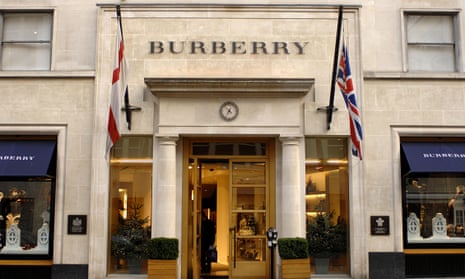The Brexit vote and the slump in sterling that followed the referendum has delivered a big boost to sales at luxury label Burberry – powered by overseas shoppers who have flocked to the UK to stock up on branded goods.
The classic British label, famous for its beige check design, said sales in the UK surged by 40% in the final three months of 2016, boosted by strong demand for goods such as its buckle bags, which start at around £500 for a mini leather version and climb to £8,000 for an alligator version.
In central London, there was little sign of a mad scramble for these bags or any other Burberry merchandise outside the brand’s Regent Street store. But a surge in luxury spending will never be as obvious as queuers battling for a Black Friday TV. The marbled flagship store of Britain’s biggest luxury brand probably has at least four immaculately black-clad assistants for every shopper – but they insist they’ve been rushed off their feet.
While Burberry’s formal statement to the City was coy about who exactly was behind the 40% uplift in UK sales, staff at its Regent Street store were far more forthcoming: it was all down to Chinese shoppers, they said.
One reckons that about 70% of shoppers visiting the brand’s flagship outlet are now tourists from China, a big surge in the last year. That’s partly down to visa changes which now enable tourists to make multiple visits over two years – previously it was just six months. But its mostly down to the near 20% plunge in the value of the pound, which has brought bargain-hunters to upmarket British stores.
Burberry is clearly catering for the lucrative Chinese market, with Mandarin-speaking shop assistants and windows touting “Give the gift of Burberry this Lunar New Year” aimed at tourists holidaying ahead of the Chinese new year on 28 January.
One young Chinese tourist visiting with his parents said: “We’re on holiday but we’re taking a look at Burberry because it’s cheaper here than at home. We might buy.”
Steve and Tuba Hancock, visiting from Australia, say they’ve been taking a look at the handbags because of the bargains on offer: “In Sydney they’re something like $1,000, whereas here they’re more like $700 or even $500,” says Steve. “It’s cheaper in England, plus we can get a tax refund when we leave the country,” adds Tuba.

Staff say regular shoppers are also contributing to Burberry’s soaring UK sales. There are more personal shopping assistants to advise on wardrobe updates and special touches such as in-store monogramming for small items such as wallets and purses, which have contributed to a double-digit uplift in spend from returning customers.
The cheapest item on offer is a £14 nail varnish and the most frequently bought items are “charms” for fixing to handbags or keys, including tiny teddies for £150 and sequinned hearts for £105.
Burberry’s trademark trenchcoat is about £1,500, but shoppers looking for something a bit more upmarket need an appointment to view the most expensive item on sale, a £28,000 alligator trench coat which is held in a safe behind the scenes, along with a matching handbag. Staff say they sold several over Christmas.
Down the road in the Bond Street store the alligator trenches are out of stock, but they have one left in python – a snip at £10,500, especially if you’re buying in dollars.
Elsewhere around the globe Burberry is doing better, after a difficult period last year. Revenue over the three months rose 4% on an underlying basis, when stripping out the impact of currency fluctuations, to £735m. Like-for-like sales across all regions rose 3%.
Sales fell in the US and were weak in continental Europe, but the company did not provide specific figures. Business picked up in France and there was low single-digit growth in Asia Pacific, with improvement in mainland China and Hong Kong.
George Salmon, an analyst at Hargreaves Lansdown, said: “Plenty of customers are jumping on planes to the UK to take advantage of the extra buying power sterling’s weakness gives them. All in all, there are plenty of encouraging signs for the group just now.”

Comments (…)
Sign in or create your Guardian account to join the discussion